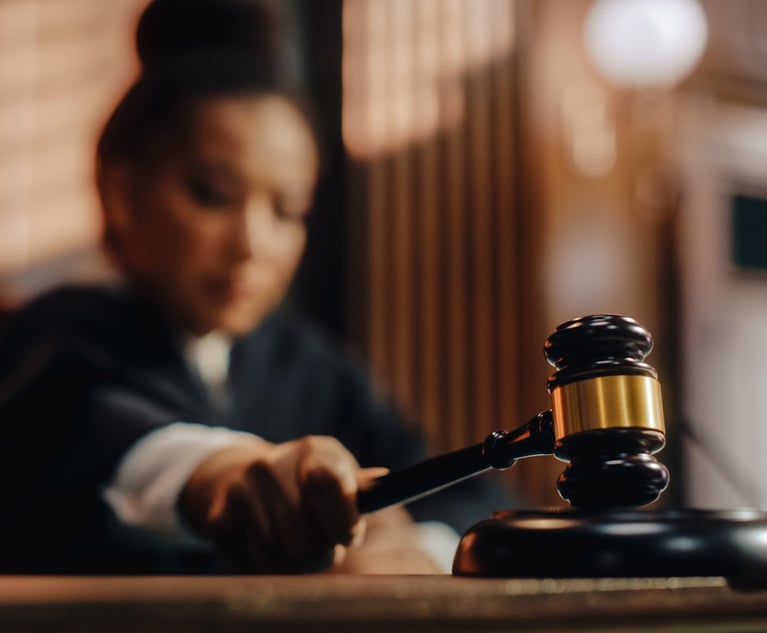Pa. Woman Can Refine ADA Claim in Lawsuit Alleging Police Triggered Boyfriend's Suicide
The U.S. Court of Appeals for the Third Circuit has given a Pennsylvania woman a second chance to bring a claim alleging the Nazareth Borough Police Department's procedures for dealing with mentally ill people violate the Americans with Disabilities Act.
March 21, 2018 at 03:31 PM
5 minute read

The U.S. Court of Appeals for the Third Circuit has given a Pennsylvania woman a second chance to bring a claim alleging the Nazareth Borough Police Department's procedures for dealing with mentally ill people violate the Americans with Disabilities Act.
The suit stems from the suicide of plaintiff Nicole Haberle's boyfriend, Timothy Nixon.
According to the Third Circuit's opinion, Nixon suffered from crippling depression for years. One day in May 2013, he stole a gun and told his girlfriend he was going to kill himself. A Nazareth Borough police officer found out, and before crisis specialists could respond, went to the apartment where Nixon was staying.
Officer Daniel Troxell announced his intention to enter, despite his fellow officers' suggestions to the contrary, according to the opinion. After he knocked on the door, Nixon went into the bedroom and shot himself.
Haberle later sued Troxell, the police department and the borough claiming that Troxell's approach constituted an unconstitutional seizure under the Fourth Amendment. She also claimed Nazareth police procedures violated the ADA.
The case was ultimately thrown out by U.S. District Judge Joseph F. Leeson Jr. of the Eastern District of Pennsylvania. The U.S. Court of Appeals for the Third Circuit largely affirmed that decision but held Tuesday that Haberle should be given a second chance to refine her ADA claim.
“Although we recognize the grief borne by those who cared deeply for Mr. Nixon, we are nonetheless persuaded that the district court was largely correct in its disposition of this case,” Third Circuit Judge Kent A. Jordan wrote in the court's opinion. “But, because we conclude that Ms. Haberle should be given an opportunity to amend her complaint with respect to her ADA claim, we will affirm in part and vacate in part the district court's rulings, and remand for further proceedings.”
Haberle's claim that she is entitled to money damages because of the department's alleged ADA violation failed, according to Jordan, because while the ADA applies to arrests, Haberle failed to show the department had a practice of violating the rights of those affected by mental health issues.
Quoting the district court, Jordan said, “'to refrain from doing so much as knocking on the door when [police] receive a call that a mentally ill individual has stolen a firearm, is contemplating suicide, and may be in the presence of others whose status is unknown is not so obvious [a deficiency] that the borough could be said to have been deliberately indifferent to the need for that training.'”
But Jordan said Haberle should still be given an opportunity to flesh out her ADA claim in order to show that the department displayed deliberate indifference to the possibility of violating the ADA.
Jordan seemed skeptical that it could be done, but maintained that Haberle should be given the chance to try.
“Even if she could ultimately prove a generalized history of civil rights violations, that would not necessarily demonstrate 'a pattern of past occurrences of injuries like the plaintiff['s.],'” Jordan said. “Because those other vaguely referenced violations have not been adequately alleged to be 'similar to the violation at issue here, they could not have put [the defendant] on notice' that policies, practices, and procedures had to be changed … Nevertheless, with respect to that defect, Haberle should be given an opportunity to amend her complaint, if possible, to salvage her ADA claim against the borough, since this failure in her complaint is not one as to which we can say definitively that amendment would be futile.”
Beyond that, Jordan said all of Haberle's claims were faulty. Troxell's actions were covered by a warrant, Jordan said, and did not constitute an unlawful seizure.
“Haberle does not argue that the warrant was invalid or was obtained under false pretenses or would have resulted in a false arrest. Even if a seizure had occurred, then, it would not have been unlawful,” Jordan said.
Third Circuit Judge Joseph Greenaway filed a concurring opinion.
Joseph E. Welsh represents Haberle and said he and his client were pleased with the decision, especially the court's ruling that the ADA does apply to police interactions.
“We will address the issue, which the majority opinion cited with respect to the ADA claim, but at this point we're still reviewing the opinion,” Welsh said.
John P. Morgenstern of Deasey, Mahoney & Valentini represents the borough.
“At the intersection of the ADA and the Fourth Amendment is a ripe area for people to criticize the police and for litigation. Police officers must be allowed, for their own safety and to protect and serve the public at large, to defuse a potentially dangerous situation. After the immediate danger is eliminated, officers can next accommodate a person's disability,” Morgenstern said in an email.
This content has been archived. It is available through our partners, LexisNexis® and Bloomberg Law.
To view this content, please continue to their sites.
Not a Lexis Subscriber?
Subscribe Now
Not a Bloomberg Law Subscriber?
Subscribe Now
NOT FOR REPRINT
© 2025 ALM Global, LLC, All Rights Reserved. Request academic re-use from www.copyright.com. All other uses, submit a request to [email protected]. For more information visit Asset & Logo Licensing.
You Might Like
View All

'Discordant Dots': Why Phila. Zantac Judge Rejected Bid for His Recusal
3 minute read
Phila. Court System Pushed to Adapt as Justices Greenlight Changes to Pa.'s Civil Jury Selection Rules
5 minute read
Pa. Appeals Court: Trial Judge Dismissed Med Mal Claims Without Giving Plaintiffs Proper Time to Fight Back
4 minute readTrending Stories
- 1'A Death Sentence for TikTok'?: Litigators and Experts Weigh Impact of Potential Ban on Creators and Data Privacy
- 2Bribery Case Against Former Lt. Gov. Brian Benjamin Is Dropped
- 3‘Extremely Disturbing’: AI Firms Face Class Action by ‘Taskers’ Exposed to Traumatic Content
- 4State Appeals Court Revives BraunHagey Lawsuit Alleging $4.2M Unlawful Wire to China
- 5Invoking Trump, AG Bonta Reminds Lawyers of Duties to Noncitizens in Plea Dealing
Who Got The Work
J. Brugh Lower of Gibbons has entered an appearance for industrial equipment supplier Devco Corporation in a pending trademark infringement lawsuit. The suit, accusing the defendant of selling knock-off Graco products, was filed Dec. 18 in New Jersey District Court by Rivkin Radler on behalf of Graco Inc. and Graco Minnesota. The case, assigned to U.S. District Judge Zahid N. Quraishi, is 3:24-cv-11294, Graco Inc. et al v. Devco Corporation.
Who Got The Work
Rebecca Maller-Stein and Kent A. Yalowitz of Arnold & Porter Kaye Scholer have entered their appearances for Hanaco Venture Capital and its executives, Lior Prosor and David Frankel, in a pending securities lawsuit. The action, filed on Dec. 24 in New York Southern District Court by Zell, Aron & Co. on behalf of Goldeneye Advisors, accuses the defendants of negligently and fraudulently managing the plaintiff's $1 million investment. The case, assigned to U.S. District Judge Vernon S. Broderick, is 1:24-cv-09918, Goldeneye Advisors, LLC v. Hanaco Venture Capital, Ltd. et al.
Who Got The Work
Attorneys from A&O Shearman has stepped in as defense counsel for Toronto-Dominion Bank and other defendants in a pending securities class action. The suit, filed Dec. 11 in New York Southern District Court by Bleichmar Fonti & Auld, accuses the defendants of concealing the bank's 'pervasive' deficiencies in regards to its compliance with the Bank Secrecy Act and the quality of its anti-money laundering controls. The case, assigned to U.S. District Judge Arun Subramanian, is 1:24-cv-09445, Gonzalez v. The Toronto-Dominion Bank et al.
Who Got The Work
Crown Castle International, a Pennsylvania company providing shared communications infrastructure, has turned to Luke D. Wolf of Gordon Rees Scully Mansukhani to fend off a pending breach-of-contract lawsuit. The court action, filed Nov. 25 in Michigan Eastern District Court by Hooper Hathaway PC on behalf of The Town Residences LLC, accuses Crown Castle of failing to transfer approximately $30,000 in utility payments from T-Mobile in breach of a roof-top lease and assignment agreement. The case, assigned to U.S. District Judge Susan K. Declercq, is 2:24-cv-13131, The Town Residences LLC v. T-Mobile US, Inc. et al.
Who Got The Work
Wilfred P. Coronato and Daniel M. Schwartz of McCarter & English have stepped in as defense counsel to Electrolux Home Products Inc. in a pending product liability lawsuit. The court action, filed Nov. 26 in New York Eastern District Court by Poulos Lopiccolo PC and Nagel Rice LLP on behalf of David Stern, alleges that the defendant's refrigerators’ drawers and shelving repeatedly break and fall apart within months after purchase. The case, assigned to U.S. District Judge Joan M. Azrack, is 2:24-cv-08204, Stern v. Electrolux Home Products, Inc.
Featured Firms
Law Offices of Gary Martin Hays & Associates, P.C.
(470) 294-1674
Law Offices of Mark E. Salomone
(857) 444-6468
Smith & Hassler
(713) 739-1250





